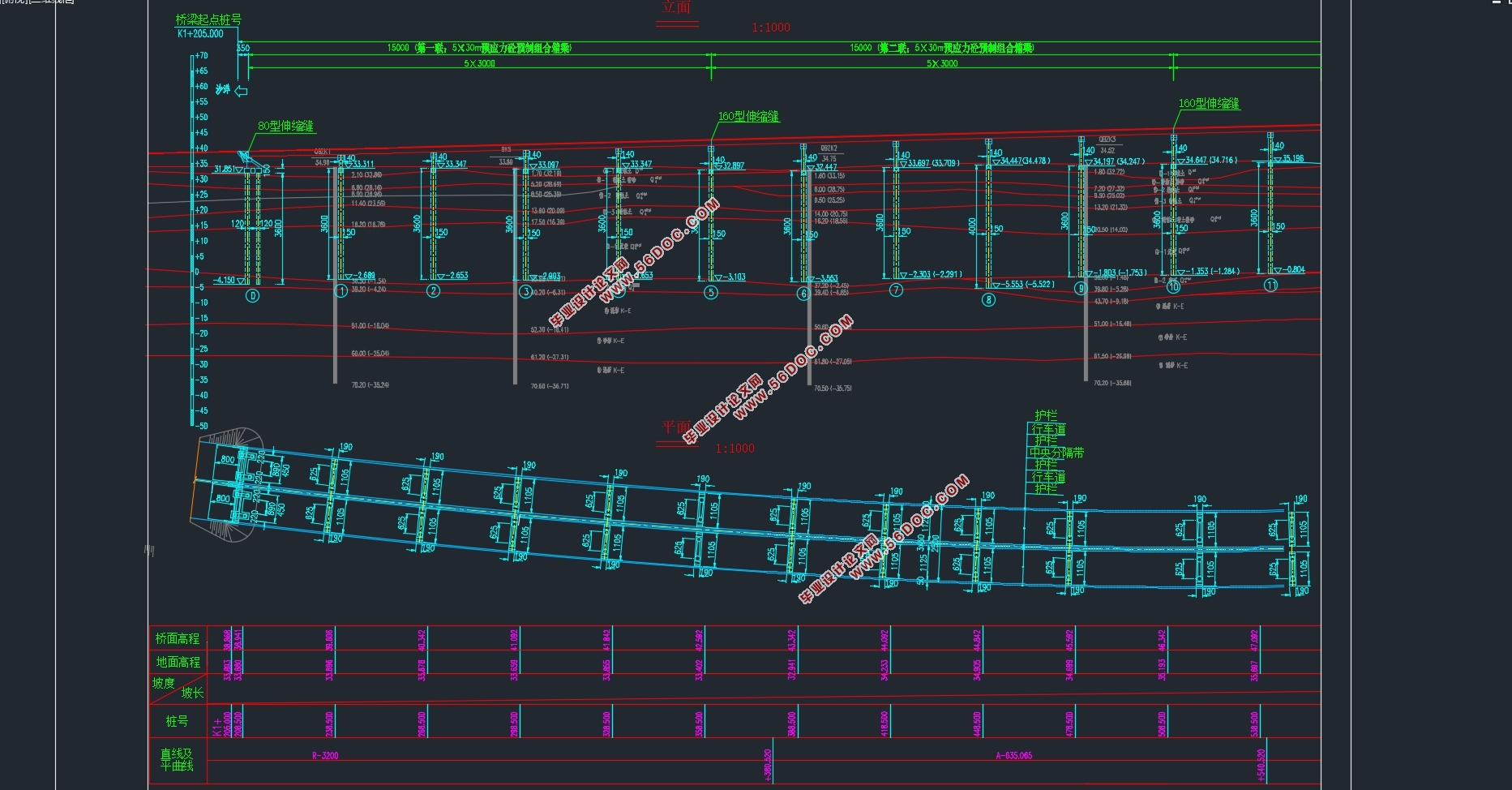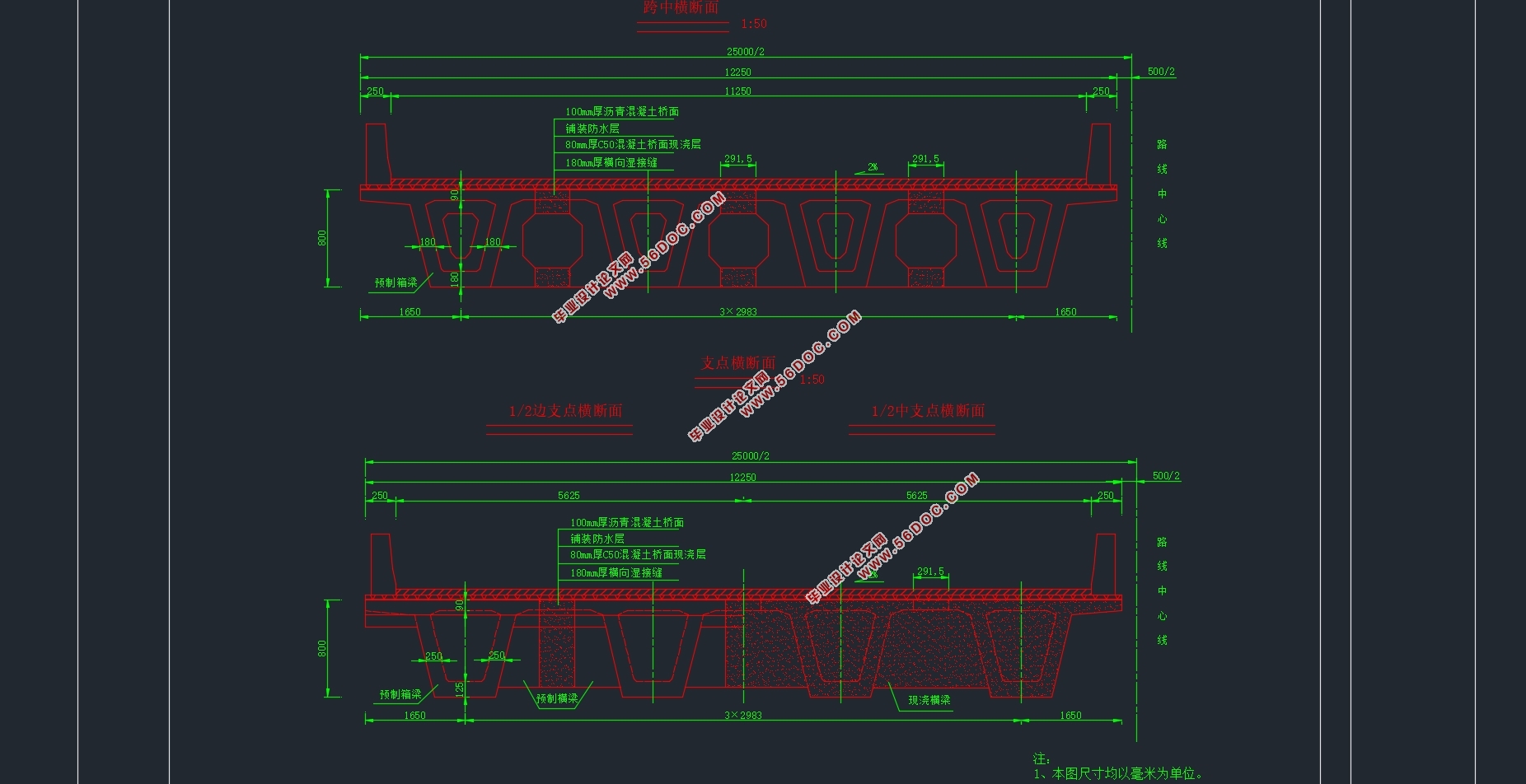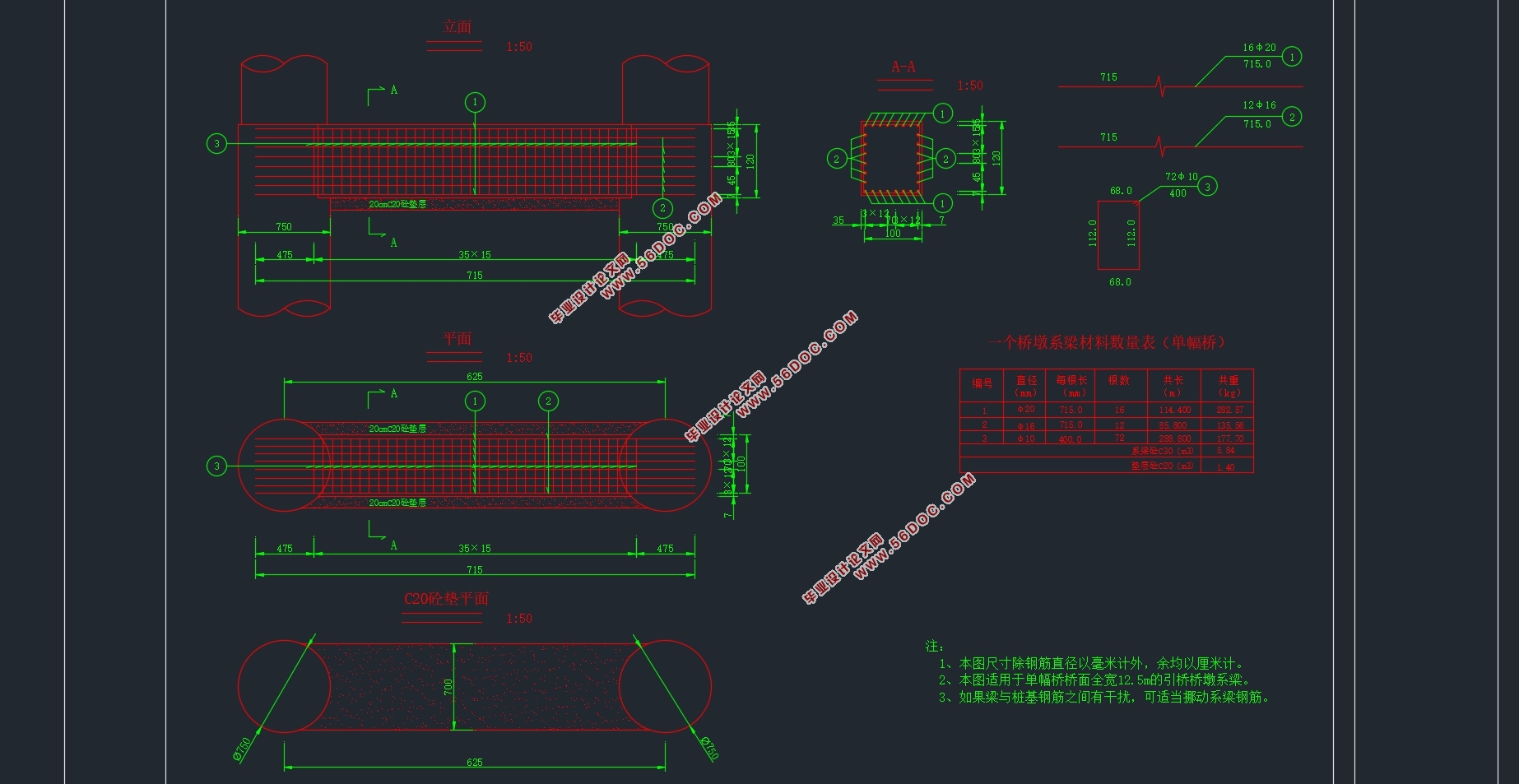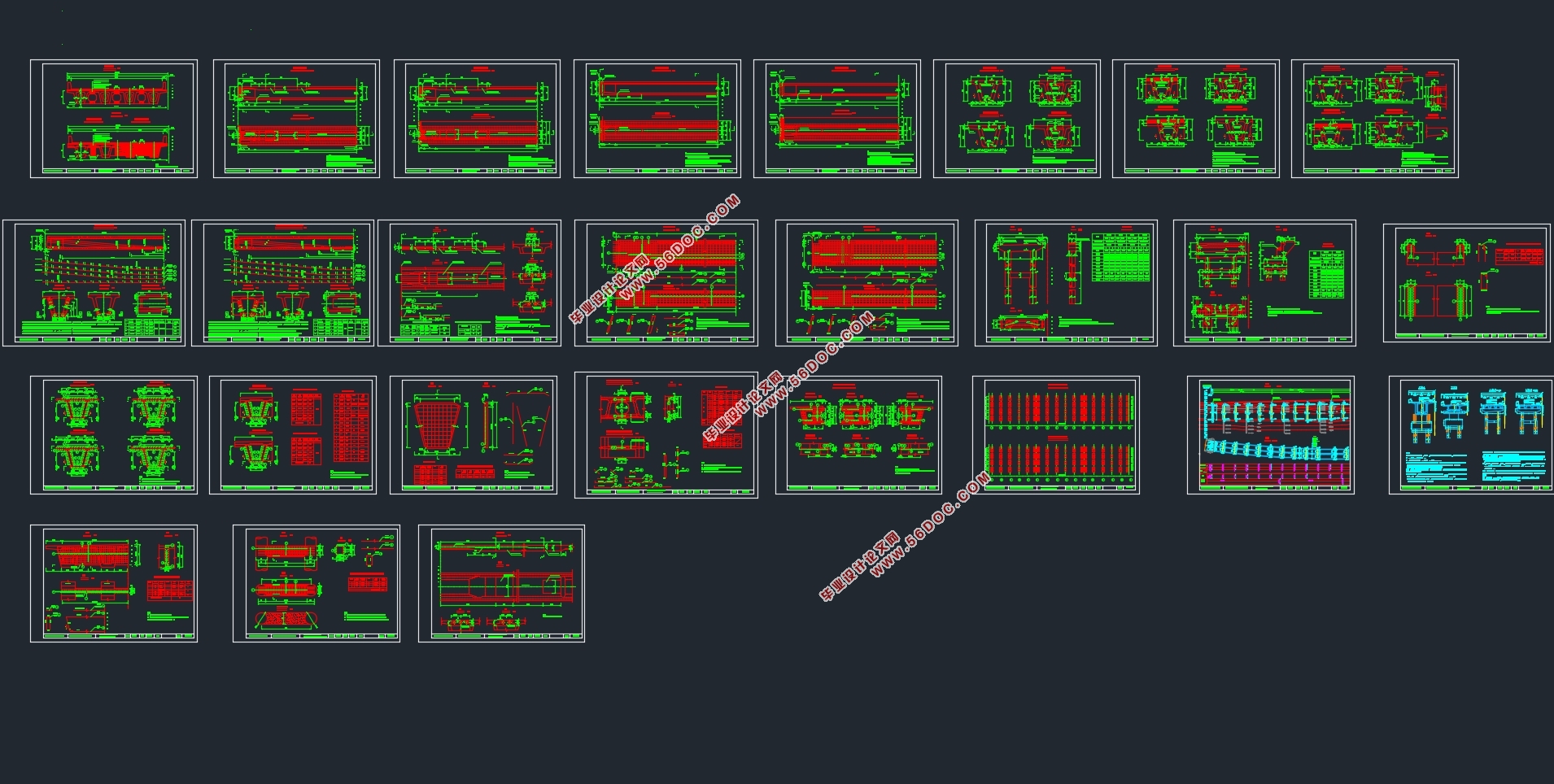G348沙洋汉江公路二桥5×30m连续箱梁桥上部结构设计(含CAD图)
来源:wenku7.com 资料编号:WK719321 资料等级:★★★★★ %E8%B5%84%E6%96%99%E7%BC%96%E5%8F%B7%EF%BC%9AWK719321
以下是资料介绍,如需要完整的请充值下载。
1.无需注册登录,支付后按照提示操作即可获取该资料.
2.资料以网页介绍的为准,下载后不会有水印.资料仅供学习参考之用. 密 保 惠 帮助
资料介绍
G348沙洋汉江公路二桥5×30m连续箱梁桥上部结构设计(含CAD图)(任务书,开题报告,外文翻译,论文说明书19000字,CAD图纸26张)
摘要
本设计题目为G348沙洋汉江公路二桥上部结构设计,桥梁跨径为5×30m,采用预应力混凝土连续箱梁,施工方法采用预制装配。
此次桥梁设计主要要完成用 Midascivil 模拟沙洋公路二桥的上部结构,并完成其内部结构分析,具体包括恒载内力标准值计算、活载内力标准值计算、收缩及徐变引起的二次内力标准值计算、预应力损失引起的二次内力标准值计算、荷载组合、各主要构件承载力极限状态验算、各主要构件正常使用极限状态验算。本次毕业设计重点在于 Midas 建模及相关验算,运用 CAD 绘制桥梁构件图,并进行计算书编写以及相关资料的收集。
关键词:连续梁桥;Midas 建模;预制装配;截面验算
Abstract
This graduation design carries on the upper structure of the second Han river highway bridge in Shayang ,whose span is 5×30m. Thebridge is designed with continuous prestressedconcrete continuous box girder, and its construction method is prefabrication.
In this paper , Midas is mainly used to simulate the superstructure of the second Han river highway bridge. Internal structure analysis, inluding standard value calculation of the internal force caused by constant load and live load, the secondaryinternal forcecaused byshrinkage and creep, the secondary internal force caused by the prestressing loss, together with load combination, checkingof the limit state of bearing capacity of the main components andthe serviceablity limit state ofthe main components is completed. The graduation design focuses on Midas modeling and related checking, using CADto finish the papers of bridge components, preparing calculation books and collecting related data.
Key word:continuous beam bridge; Midas modeling; prefabrication;sectionchecking
2.1.1 设计标准
(1)公路等级:一级公路,双向四车道;
(2)设计速度:80km/h;
(3)桥梁结构设计基准期:100 年;
(4)设计荷载:公路-I级;
(5)净空高度:4.5m;
(6)桥面宽度:0.5m(防撞护栏)+11.25m(桥面净宽)+0.5m(防撞护栏)+0.5m(中央分隔带)+0.5m(防撞护栏)+11.25m(桥面净宽)+0.5m(防撞护栏)=25.0m;
(7)抗震设防标准:抗震设防烈度为7度;
(8)航道等级:Ⅲ-(2)级;
(9) 坐标系及高程系统:本项目采用1980西安坐标系和1985国家高程系统。




目录
摘要 I
Abstract II
第一章绪论 1
1.1 装配式预应力混凝土连续梁简介 1
1.2 Midas软件简介 2
1.3 本次设计的任务要求 3
第二章桥梁的方案设计 4
2.1 沙洋汉江公路二桥设计基本资料 4
2.1.1 设计标准 4
2.1.2 主要材料及性能 4
2.2 上部结构设计 6
2.2.1 总体设计 6
2.2.2 结构尺寸 6
2.3 施工要点 9
第三章 Midas建模 11
3.1 Midas建模过程 11
3.1.1 操作环境的设定 11
3.1.2 材料的定义 12
3.1.3 截面的定义 16
3.1.4 节点与单元的建立 19
3.1.5 静力荷载工况的定义 21
3.1.6 温度荷载的定义 23
3.1.7 预应力荷载的定义 24
3.1.8 移动荷载工况的建立 26
3.1.9 静力荷载工况的建立 28
3.1.10 边界条件的定义 28
3.1.11 组的定义 30
3.1.12 施工阶段的定义 31
3.2 Midas分析过程 32
3.2.1 主控数据 32
3.2.2 荷载组合 32
3.2.3 模型的内力图 33
3.2.4 运行PSC设计 34
第四章结构内力计算 36
4.1 恒载内力计算 36
4.2 活载内力计算 37
4.3 温度内力计算 38
4.4 内力组合分析 39
4.4.1 荷载的分类 39
4.4.2 荷载分项系数 39
4.4.3 荷载组合 40
第五章预应力损失及有效预应力计算 42
预应力损失分析 42
第六章主梁截面验算 46
6.1 施工阶段法向压应力验算 46
6.2 受拉区钢筋拉应力验算 47
6.3 使用阶段正截面抗裂验算 49
6.4 使用阶段正截面压应力验算 52
6.5 使用阶段斜截面主压应力验算 54
6.6 使用阶段正截面抗弯验算 56
第七章 结论 59
参考文献 60
毕业设计总结 61
致谢 62
|









